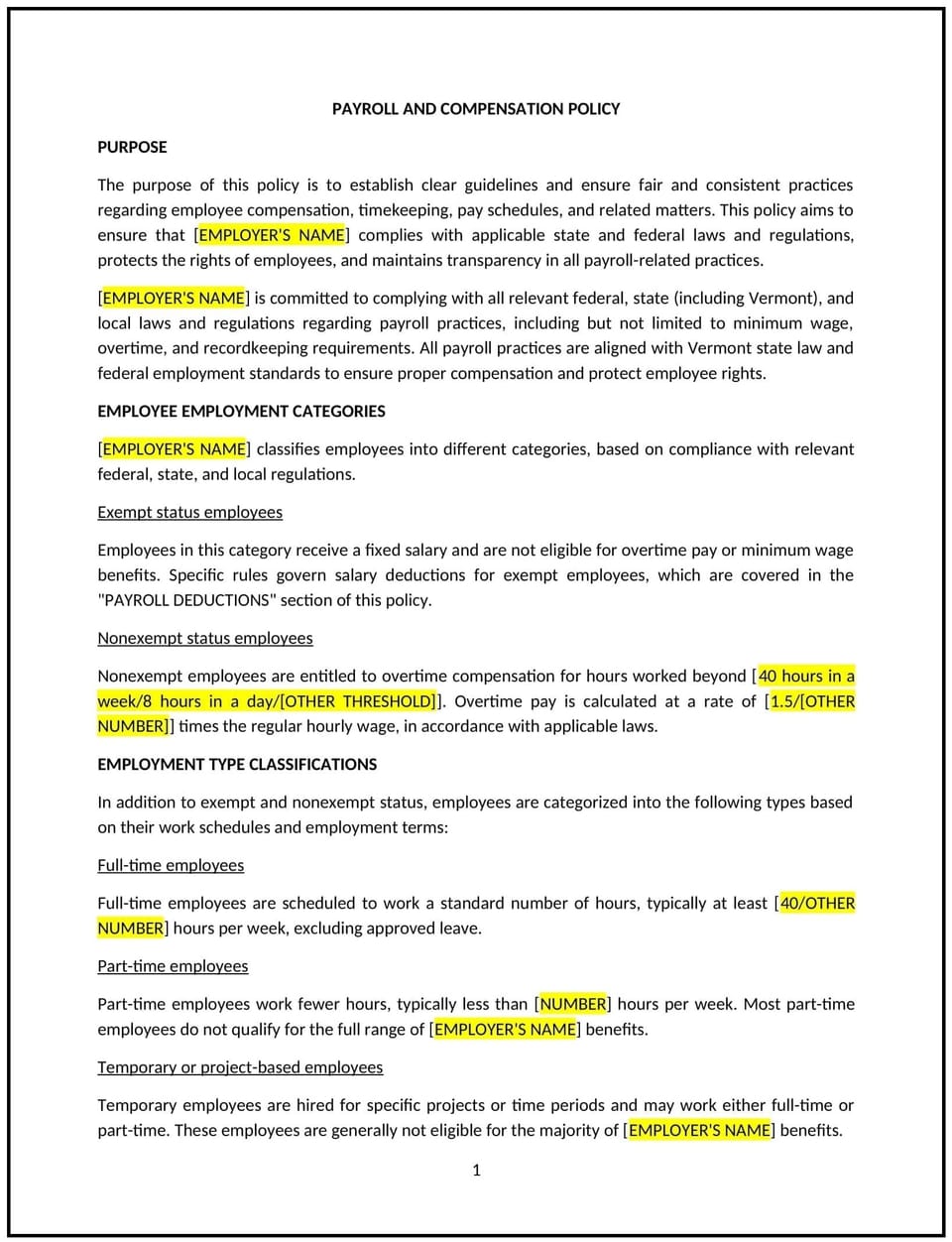Payroll and compensation policy (Vermont): Free template

Payroll and compensation policy (Vermont)
This payroll and compensation policy is designed to help Vermont businesses manage employee compensation, including wages, salaries, and other payments, in a transparent and compliant manner. It establishes guidelines for payroll processes, wage adjustments, and compliance with Vermont labor laws.
By adopting this policy, businesses can ensure accurate payments, foster employee trust, and reduce payroll-related disputes.
How to use this payroll and compensation policy (Vermont)
- Define pay structure: Specify how employees are classified (e.g., hourly, salaried, exempt, non-exempt) and how compensation is determined.
- Include payroll schedule: Provide details on pay periods, paydays, and any variations for holidays or weekends.
- Address overtime: Outline eligibility for overtime pay and the calculation process, adhering to Vermont and federal wage laws.
- Include wage adjustments: Describe processes for pay increases, bonuses, or salary adjustments, including performance-based changes.
- Specify deductions: Detail standard deductions, such as taxes and benefits, and any permissible voluntary deductions.
- Emphasize compliance: Reinforce adherence to Vermont’s minimum wage laws and other compensation-related regulations.
- Monitor payroll accuracy: Establish procedures for resolving payroll errors or discrepancies promptly.
Benefits of using this payroll and compensation policy (Vermont)
This policy provides several benefits for Vermont businesses:
- Strengthens compliance: Aligns with Vermont labor laws, including minimum wage and overtime requirements.
- Promotes transparency: Provides clear guidelines for how employees are paid and how compensation decisions are made.
- Builds trust: Demonstrates a commitment to fairness and accuracy in payroll practices.
- Reduces disputes: Minimizes misunderstandings and conflicts related to wages or deductions.
- Enhances efficiency: Streamlines payroll processes and improves accuracy in wage payments.
Tips for using this payroll and compensation policy (Vermont)
- Communicate the policy: Share the policy with employees during onboarding and include it in the employee handbook or internal resources.
- Provide training: Train payroll and HR staff on Vermont wage laws, payroll systems, and compliance requirements.
- Maintain records: Keep detailed payroll records, including hours worked, wages paid, and deductions, to ensure accuracy and compliance.
- Encourage reporting: Create a process for employees to report payroll discrepancies or concerns promptly.
- Update regularly: Revise the policy to reflect changes in Vermont laws, workplace practices, or payroll systems.
Q: How often should payroll be processed?
A: Payroll is typically processed weekly, bi-weekly, or monthly, depending on the company’s schedule, and should adhere to Vermont’s payday requirements.
Q: What is Vermont’s minimum wage, and how does it affect payroll?
A: Vermont’s minimum wage must be met or exceeded for all non-exempt employees, with regular updates to reflect changes in state law.
Q: How should overtime be calculated?
A: Overtime is calculated at 1.5 times an employee’s regular hourly rate for hours worked over 40 in a workweek, as required by federal and Vermont law.
Q: How can businesses handle payroll errors?
A: Payroll errors should be addressed promptly by reviewing the discrepancy, informing the employee, and correcting the issue on the next paycheck or through supplemental payment.
Q: Are bonuses and incentives covered under this policy?
A: Yes, this policy outlines how bonuses and incentives are determined, approved, and paid, ensuring alignment with company goals and employee agreements.
Q: What deductions are allowed under Vermont law?
A: Allowed deductions include taxes, benefits, garnishments, and voluntary contributions, as long as they are agreed upon and comply with Vermont law.
Q: How often should this policy be reviewed?
A: This policy should be reviewed annually or whenever significant changes occur in Vermont labor laws or payroll systems.
Q: Does this policy apply to contractors or freelancers?
A: No, contractors and freelancers are typically paid under separate agreements and are not subject to this policy, which applies to employees only.
This article contains general legal information and does not contain legal advice. Cobrief is not a law firm or a substitute for an attorney or law firm. The law is complex and changes often. For legal advice, please ask a lawyer.


